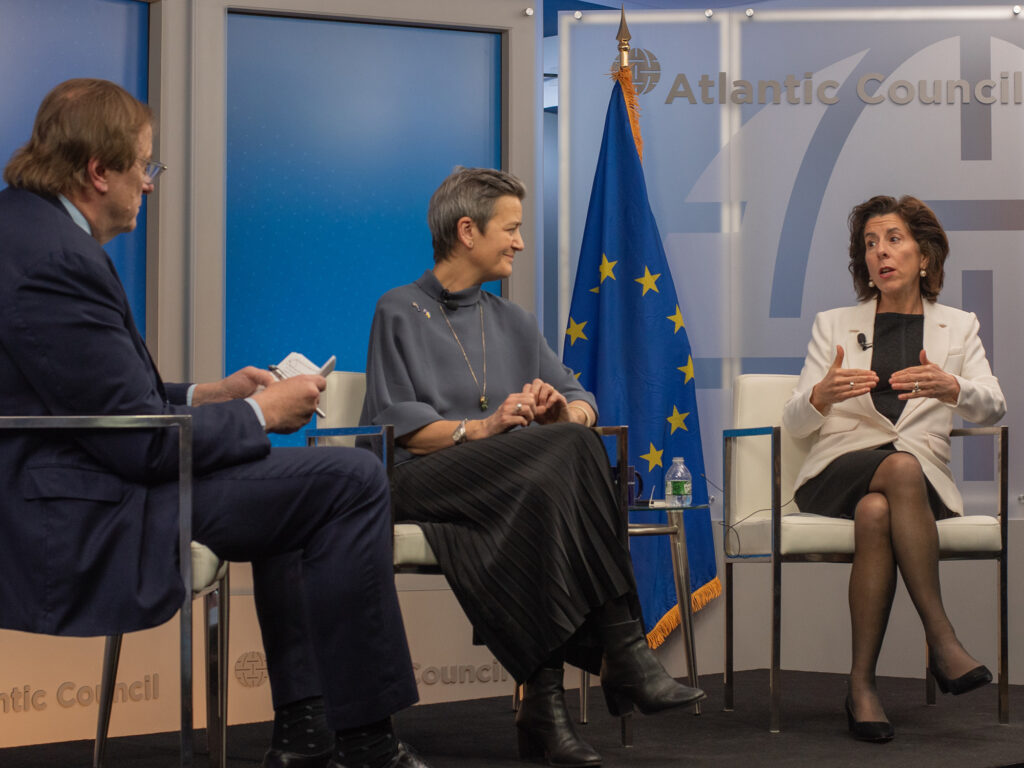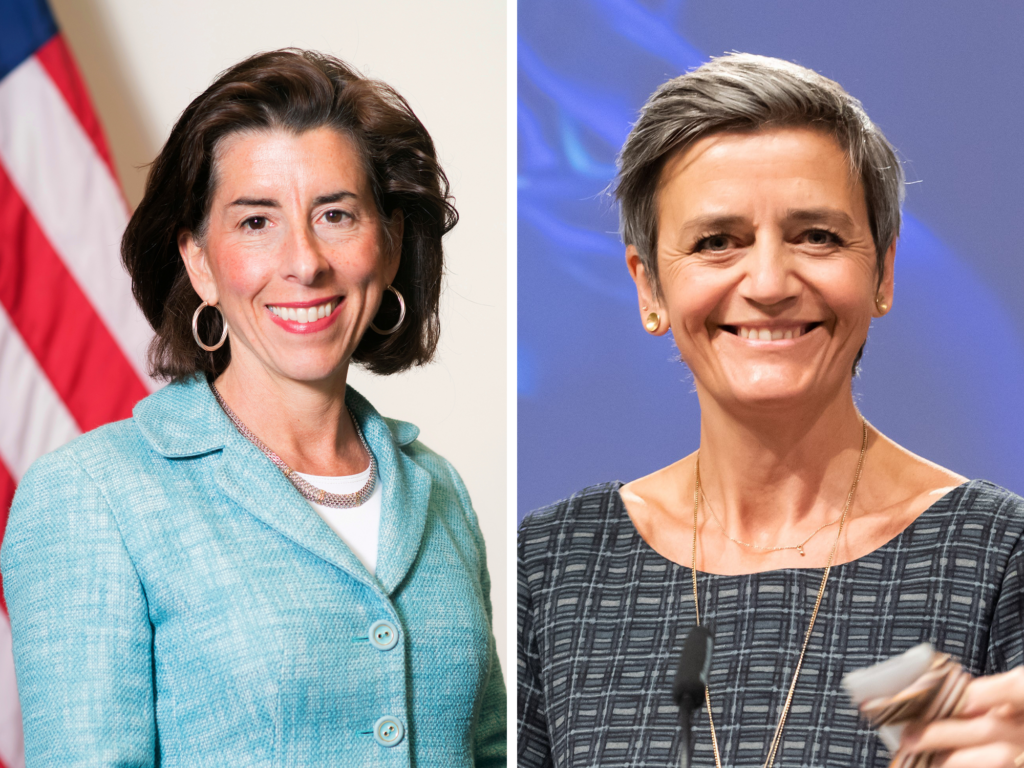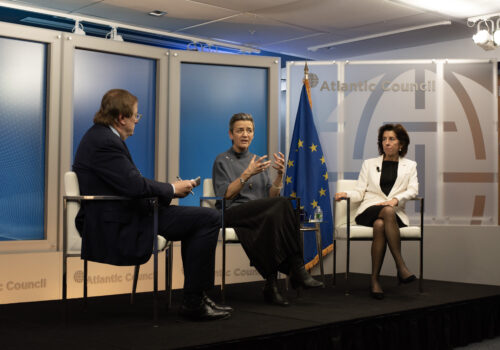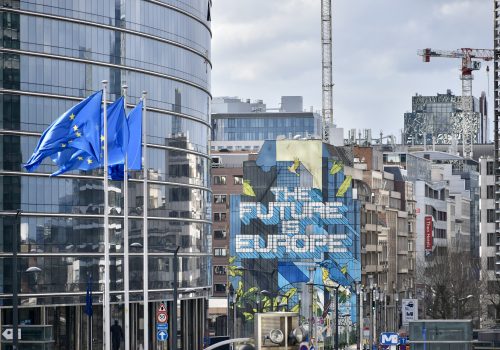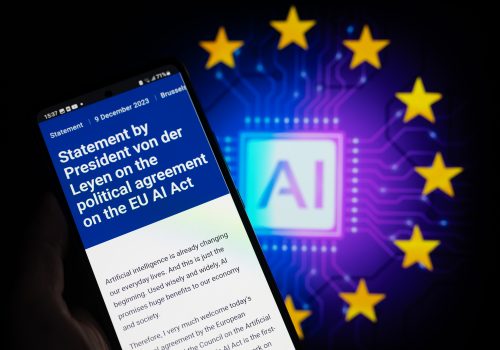Watch the event
According to US Commerce Secretary Gina Raimondo, the United States and European Union (EU) don’t have a moment to wait in setting standards for the development and use of artificial intelligence (AI). “If the US and EU don’t show up,” she warned, “China will, [and] autocracies will.”
Raimondo spoke at an Atlantic Council Front Page event on Tuesday alongside European Commission Executive Vice President Margrethe Vestager, who cautioned that the field of standardization in technologies is already being “dominated by nonmarket players or Chinese players.” But “we need to be much more present in standardization for us,” she said. “We need to have a presence.”
The leaders spoke shortly after the fifth meeting of the EU-US Trade and Technology Council (TTC) in Washington, where officials touched on everything from AI to climate policy to semiconductors.
In the US-EU relationship, “there are irritants for sure,” Raimondo admitted, “but fundamentally what binds us is massively more consequential than the irritants.”
Below are more highlights from the conversation, which was moderated by Atlantic Council President and Chief Executive Officer Frederick Kempe.
EU+US on AI
- Raimondo argued that the TTC will “prove to be exceedingly valuable” as AI tools continue to evolve. She said that the “muscle” the TTC has “built up”—in generating trust between private-sector stakeholders and the governments leading the United States and EU—will help in “bringing us together to write the rules of the road of AI.”
- But while Raimondo said that a “transatlantic approach” to AI could possibly come out of the TTC, she said she doubted whether “joint regulation” is feasible. “It will be some time before the US Congress passes a law that relates to the governing of AI,” the commerce secretary pointed out. “In the absence of that, there’s an awful lot of work to be done.”
- The commerce secretary explained that normally when governments develop regulations, each country first goes about writing rules separately before gathering with others to harmonize. “With AI, we can harmonize from the get-go because we haven’t yet written these regulations or rules or standards,” she said.
- In response to concerns that governments will always be regulating too slowly to keep up with tech, Vestager said that she thinks “that is just plain wrong” and that it is the responsibility of governments to ensure that technology respects society’s values.
Keep “eyes wide open” on China
- Vestager outlined the EU’s “very complex relationship” with China, given that it is an important partner in fighting climate change—but it is also a systemic rival and an economic competitor. She explained that the EU is working to “derisk [its] dependencies” on countries such as China by getting more countries to screen foreign direct investments and working to prevent countries from skirting export controls.
- Regarding China, it is in the “self-interest” of the United States and EU “to work together,” Raimondo argued. “There are real national security concerns for both of us,” she added, “and we have to be eyes wide open about that and work together to protect… our countries.”
- Among those national security concerns: “We have to keep our eye on the number of Chinese-made electric vehicles being sold in Europe,” Raimondo said, explaining that sophisticated electric vehicles collect a “huge amount of information” about the driver and their surroundings. “Do we want all that data going to Beijing?” she asked.
A TTC progress report
- Raimondo argued that the TTC has offered the transatlantic partners another opportunity to build trust, collaborate, and share information. The TTC has the added benefit of offering the partners a forum “where we can complain about each other in a constructive manner,” Vestager chuckled.
- While steel tariffs and the US Inflation Reduction Act have been examples of what Raimondo called “irritants” in the relationship, she said it is important that the transatlantic partners agree on “the principles and goals” behind regulating trade and tech. She attributed differing US and EU regulation methods to “differences in our systems of government… [and] political realities.”
- Beyond the ministerial meetings, Vestager said that the TTC has resulted in tech and trade teams having “gotten to know each other really well,” which she says made it easier to, for example, work together on sanctioning Russia after its full-scale invasion of Ukraine in 2022. “It went so fast with very little sort of bumps [in] the road because people knew each other,” she explained. “I think it’s really important not to underestimate what it means that you know who to call.”
- With elections looming on both sides of the Atlantic—and thus the possibility of new leaders who feel differently about US-EU collaboration—Raimondo said that the forum is taking measures to solidify its plans, for example renewing its memoranda of understanding. Raimondo added that with the TTC engaging stakeholders from the private sector, she hopes that there’s demand from both industry and civil society to keep the collaboration going. “There’s much more work to be done,” she said.
Katherine Walla is an associate director of editorial at the Atlantic Council.
Watch the full event
Further reading
Tue, Jan 30, 2024
Gina Raimondo and Margrethe Vestager on transatlantic approaches to trade, AI, and China
Transcript By
The US commerce secretary and European Commission executive vice president discussed transatlantic trade and technology cooperation at the Atlantic Council.
Tue, Dec 19, 2023
Three next steps for the EU’s approach to economic security
Econographics By Elmar Hellendoorn
The EU’s Strategy on Economic Security, published this summer, was the first official effort to present a more coherent view on the European policy approach at the intersection of economics and geopolitics. In the end, however, the EU's approach to economic security can only be successful if it is tied to Europe's long-term political objectives.
Mon, Dec 11, 2023
Experts react: The EU made a deal on AI rules. But can regulators move at the speed of tech?
New Atlanticist By
EU policymakers reached a deal on Europe’s first comprehensive artificial intelligence rules. Atlantic Council experts share their insights on the breakthrough.
Image: Margrethe Vestager and Gina Raimondo speak at an Atlantic Council Front Page event on January 30, 2024.
